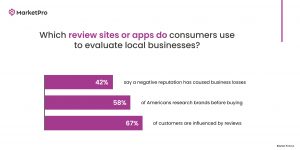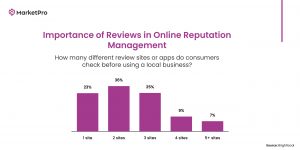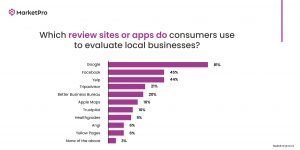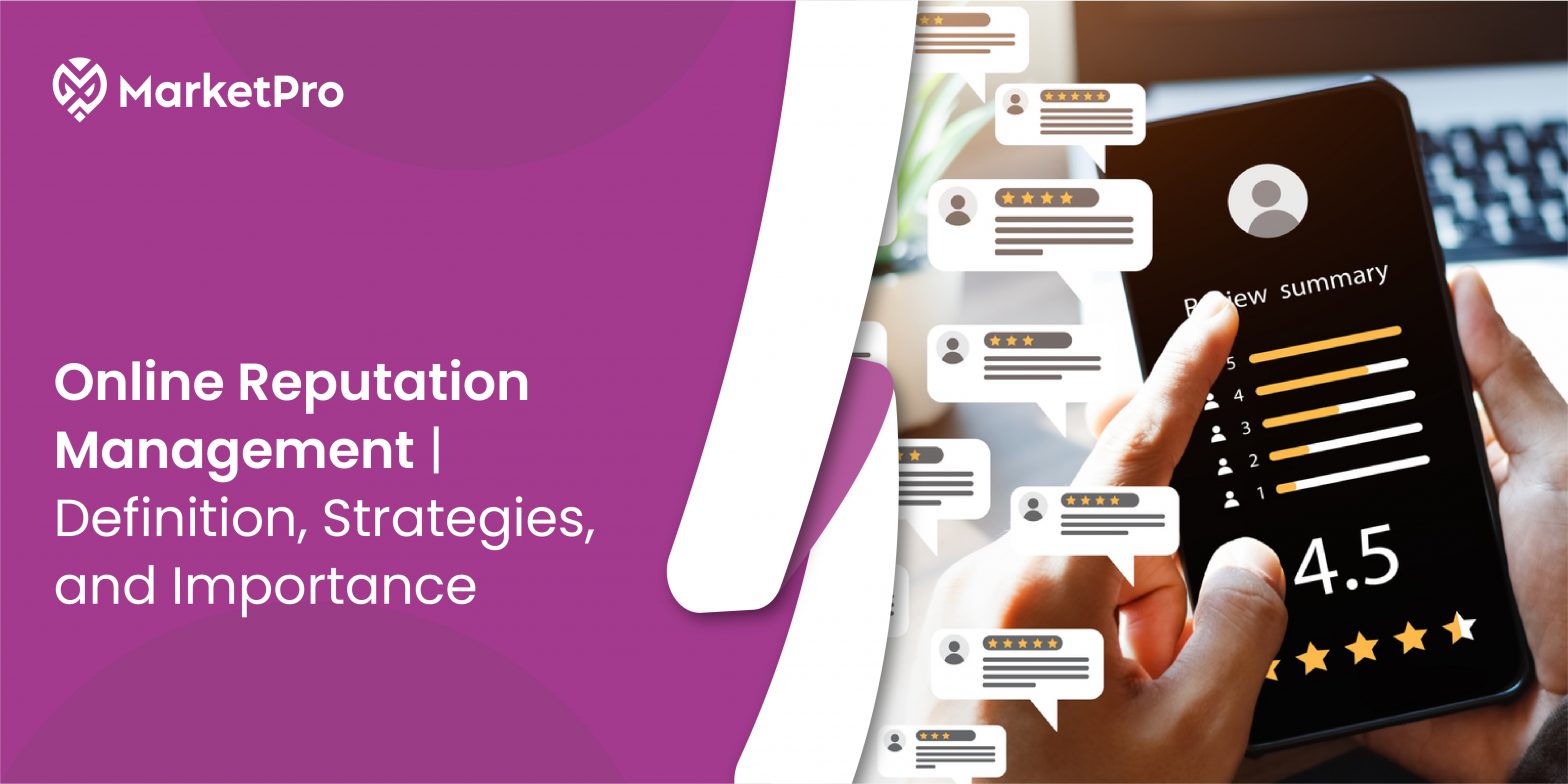Gone are the times when businesses didn’t consider handling their online reputation. But now that’s not the case at all. With the rise of countless platforms where people can leave reviews, comments, and feedback, it’s nearly impossible for businesses to keep tabs on everything.
Let’s imagine a single negative review amidst a sea of positive ones. Where do you think the consumer’s or search engine’s attention goes? To the negative one. A single negative review can possibly deter a brand’s overall reputation.
This demands an immediate solution. Businesses must protect their reputation from false information or deliberate attacks, and that’s where Online Reputation Management (ORM) becomes essential. Buckle up and read ahead to ensure how you can save your brand’s reputation with practical measures.
What is Online Reputation Management?
Online reputation management involves businesses’ activities and efforts to paint a positive image of their company’s digital presence. It helps firms cope with negative agendas and false information by turning them into positive experiences and improving their consumers’ perception regarding their online presence.
Businesses work on straightening negative reviews and experiences by remaining active and vigilant on their social profiles and review sites while handling their Organic Search Engine Optimization (SEO) and PR campaigns for better results.
Why is Online Reputation Management Important?
A famous Chinese proverb says, “The reputation of a thousand years may be undermined by the conduct of one hour.” This quote is undoubtedly a guiding pointer for any brand looking to thrive in the digital space.

Online reputation management is not limited to handling prospects’ complaints or bad experiences or turning around false agendas on social media or other review sites. They also collectively create a strong online reputation for their brand’s search engine presence. The better their search engine presence is, the higher the odds of ranking higher in Search Engine Result Pages (SERPs).
Online reputation management ensures businesses have positive reviews on Google and other listing sites. Their vigilance on listing sites, especially search engine platforms, encourages buyers to take their brand presence seriously and makes them a preferable choice to buy in the future.
How To Make The Best Out of Online Reputation Management?
Like any other marketing strategy, online reputation management strategy also requires detailed research, tactics, and techniques to generate a strong influence. Some of the tips below can help businesses protect their brands’ presence:
1. Examine Online Reputation Score
Examining online reputation management scores means auditing a business’s public image and identifying all the elements that showcase its good or bad reputation from the customer’s perspective.
The main aim is to find where the brand is lacking in the public’s eye and from what volume it handles its brand’s perception. This helps them find breakpoints and create a planned strategy to solve them.

Monitoring comments and reviews is the primary term, but it is still essential in handling a brand’s reputation because User-Generated Content (UGC) has become more necessary than ever.
Some of the practices businesses should do are:
- Visit their Google My Business (GMB) profile. Then, review their ratings, reviews, and feedback.
- Review their social media platforms.
- Visit review sites (e.g., Yelp, Angi).
2. Keep a Sharp Eye on Brand Mentions
Did you know 88% of users encourage buying from a product that gives replies to all of its reviews?
Businesses need to stay vigilant in this fast-paced digital space. Consumers don’t appreciate it when businesses reply to their reviews or important queries within several days. Companies must adapt certain measures to put a tab on their digital sphere.
However, remaining active on every platform or site is impossible. That’s why companies must invest in brand monitoring tools that centralize and organize all their brand mentions and related notifications in a single platform. These businesses save time manually visiting different sites like GMB, Yelp, and Angi. Instead a single app can help them monitor all the important sites.
3. Prepare a Crisis Management Strategy
Brands will likely face crises without warning in the future, so they are advised to always ace their crisis management strategy.
They need to be prepared in all domains, from firmly controlling brand mentions to handling public general reviews and demonstrating their strong stance on current global events.
To better manage their digital presence, they can access a few things in advance to cope with future crises. Some of them are:
- Keeping their brand monitoring tools alert all the time.
- Understanding which channels have more volume in terms of target consumers and contain better communication strategies for them
- Be ready to flood the digital space with positive content or test drafts to handle negative feedback.
4. Focus More On User-Generated Content
Businesses need to focus on getting more reviews on their Google profiles and other review sites. This behavior shows customers how sincere businesses are about listening to their valuable feedback.

At the same time, this also helps brands rank in search engine results and discover more from their customers. Positive reviews on a business website allow consumers to trust the product and speed up their decision-making progress.
Some of the ways to encourage customers to review are:
- Automate the follow-up process, for example, by using a pop-up form on their site to get reviews after customers make a purchase.
- Simply send a review form in an email after the customer purchases.
- Always engage and reply to their customer reviews to show how considerate and sincere they are in listening.
Reviews can seriously make or break any company’s online reputation. Businesses need to add this expertise to strengthen their online brand reputation management.
Suggested Read: A Complete Guide to Brand Marketing in 2024
Some of the Powerful Forms of ORM
After learning some significant tips for creating an ORM strategy, let’s discuss some of their essential factors below:
Social Channels
71% of consumers are likely to recommend a brand to friends and family after a positive social media experience.
Social media has become a new hub for businesses to interact and listen to customers more efficiently than other marketing channels. Companies can engage in meaningful conversations with their customers and listen to their queries and complaints more clearly than ever.
However, while social media is an excellent source for businesses to strengthen their relationships, it also possesses the potential to harm any brand’s digital presence. Online reputation management agencies utilize social media listening tools to convert feedback into actionable outcomes.
Review Sites
Review sites like Yelp, Trustpilot, or Google Profile mirror any brand’s online reputation. As time passes, consumers are becoming more skeptical about buying anything online, and reviews are one of the single most crucial things that resolve their doubts.
Businesses must add a review section on their website homepages, encouraging other prospects to acknowledge their authenticity. Moreover, companies must add their presence to popular review sites, expanding their reach and digital image.
Bloggers and Influencers
Influencer marketing is another form of digital publication for businesses. Companies hire influencers and famous digital bloggers to promote brands and spread the good word about their digital presence.
Influencers play a significant role in endorsing any brand’s digital presence; therefore, their selection should be made with explicit consideration, such as understanding their past experience with the Internet, positive influence, and relevance in their industry.
Streamline Your Brand’s Online Reputation With Market Pro
Online reputation management services are helping businesses to manage their online presence more clearly and effectively. Instead of relying on branded content and fancy marketing campaigns, companies create strategies that are designed to paint their brand’s positive presence among review sites, social media channels, search engine presence, and other influential sites.
With Market Pro, you don’t need to worry about managing your online reputation; with all the experts under one hub, we know how to light up your brand’s presence amidst the competitive bubble.

